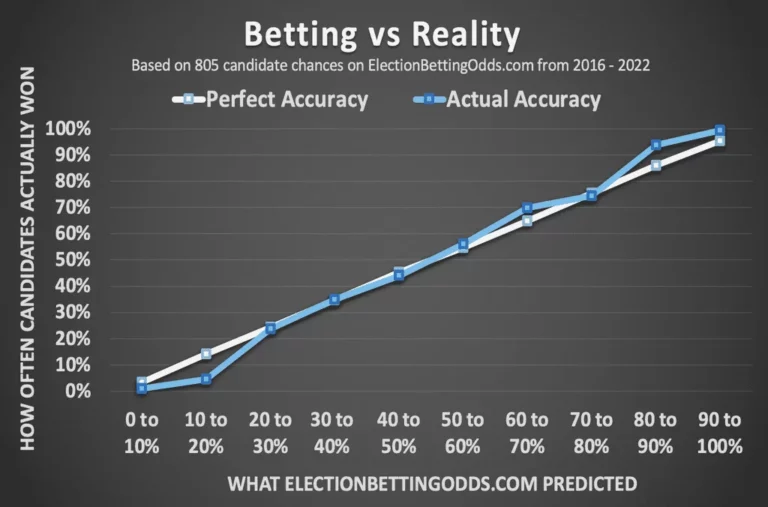
The election betting odds were right — yet again. The betting market successfully predicted the 2024 presidential race, calling it in favor of President-elect Donald Trump. Well over $3 billion was bet on the race, including over $2.6 billion on Polymarket alone.
While some have scoffed at the prospect, proponents of betting markets’ predictive prowess were vindicated once again on Tuesday when Trump defeated Vice President Kamala Harris to return to the White House.
It appears Trump will have a decisive 312-226 Electoral College victory, a far cry from “the closest presidential election race in history” that many experts predicted. The bettors did not think the race would be all that close, as they gave him a 20.8-point betting odds lead on Election Day.
The bettors mostly nailed it
The bettors predicted a Trump victory for 30 consecutive days going into the election, giving him a 28.9-point lead a week ago. Two weeks ago, bettors predicted he would win all seven swing states. After a number of polls that favored Harris were released in Wisconsin and Michigan, as well as one poll showing her leading in solid-red Iowa, bettors pared back their expectations.
As it turns out, paring back their expectations was the only error the bettors made as the results nearly identically reflected their previous prediction. Harris pulled ahead in the betting markets at the last minute in Wisconsin and Michigan but lost both states.
Election markets tend to favor Democrats in general, but less so than the polls or predictive models such as FiveThirtyEight. They tend to be more “surprised” when a Republican candidate wins, which makes it no surprise that Trump outperformed the betting odds in 2024.
The betting markets not only predicted the presidency, but they were right about the Senate, too. Bettors predicted the GOP would regain control of the Senate with over 80% certainty on Election Day. Republicans had been heavily favored to win the Senate since July.
Bettors predicted a 52-48 majority for Republicans in the Senate, and as of Wednesday, the GOP has secured 52 seats in the Senate. However, it is more than likely that Republicans take at least one of Pennsylvania and Nevada as well.
According to ElectionBettingOdds.com founder Maxim Lott, this is not surprising either. Given that there were five Senate elections where Republican underdogs were given around a 20% to 30% chance of winning, he told the Washington Examiner that statistically, at least one of those underdogs should win.
The House majority has not been decided as it is too close to call, but bettors had that race as a coin-flip. Over the last week of the election cycle, the betting odds lead of control over the House changed hands numerous times, with neither party getting a major edge. Republicans had their best odds to win the House on Halloween with a 55.6% chance to win, while Democrats were given a 52% chance on Election Day.
How the betting markets shifted throughout the race
Once the dust settled on the 2024 primaries and everyone knew, or thought they knew, who the two major candidates were going to be, Trump became the slight betting favorite over then-Democratic nominee President Joe Biden.
Trump went on to expand his betting odds lead with a dominant 48.2-point margin shortly after he was shot in the ear in July, which followed Biden’s June 27 debate “meltdown.”
On July 3, Harris’s odds to be the next president surpassed Biden’s, even though he hadn’t yet dropped out of the race. Bettors accurately predicted that she would replace Biden, even when pundits and the president himself were adamant that he would remain in the race.
Once Harris was announced as the new Democratic nominee, the overwhelming amount of positive media coverage characterizing her as a “joyful warrior” tightened the odds, resulting in her exchanging the lead with Trump several times between August and September 2024.
The first major momentum shift of the Trump-Harris matchup came after the Sept. 10 presidential debate. Trump’s debate performance tanked his odds, and Harris went on to lead in the betting markets for 26 consecutive days as she mostly avoided interviews with journalists.
Lott, of ElectionBettingOdds.com, told the Washington Examiner that he noted another shift after the Oct. 1 Vice Presidential debate between Vice President-elect J.D. Vance and Gov. Tim Walz (D-MN). Days later, on Oct. 6, Trump took a slight lead in the odds. The next day, Harris appeared on 60 Minutes in an interview that was criticized by both sides of the aisle, and the former president saw his odds surge.
After Trump took the betting odds lead on Oct. 6, he spent the next three weeks expanding that lead until a flurry of polls showing momentum for Harris in Wisconsin, Michigan, and Iowa resulted in his margin dropping from 28.9 points to 9.9 points in a matter of days before correcting back to 20.8 points.
Trump went on to outperform the odds and the polls en route to victory in the Electoral College and popular vote. His outperforming of the polls follows a trend of every GOP presidential candidate except Mitt Romney doing so since 2004.
History shows a track record of success
It comes as no surprise that the bettors got it right again, as historical data show that betting odds are extremely efficient at predicting a candidate’s chance of winning an election. Candidates given a 75% chance to win, for example, will win approximately 75% of the time, data show.
Between 2016 and 2022, ElectionBettingOdds tracked 807 different candidates’ chances across a number of elections. They found that if bettors gave a candidate between a 90% and 100% chance to win, that candidate won 99.4% of the time. Candidates given between an 80% and 90% chance won 93.8% of the time.

Between 70% and 80%, that percentage falls to 74.4%. Between 60% and 70%, it’s 68.8%.
In the margin between 50% and 60%, it’s 56%. Between 40% and 50%, it’s 44%. Between 30% and 40%, it’s 34.9%. Between 20% and 30%, it’s 23.8%. Between 10% and 20%, it’s 4.5%, and between 0% and 10%, it’s 1%.
In total, 88.9% of candidates favored in the election betting odds won their election out of the 807 tracked. Trump was not only favored, but given approximately a 60% chance to beat Harris.
CLICK HERE TO READ MORE FROM THE WASHINGTON EXAMINER
However, the data show an “underdog bias” is present in races where one candidate is heavily favored over the other. This bias produces a higher predicted chance of upset in races where the outcome is essentially a forgone conclusion.
Only three betting underdogs have won the presidential election since the 1940s, and two were only slight underdogs. John F. Kennedy won at +110, Jimmy Carter won at +100, and Trump won in 2016 despite +375 odds. Even in 2016, bettors gave Trump greater than a 20% chance to win, while many of the top predictive models had him in single-digit territory.






